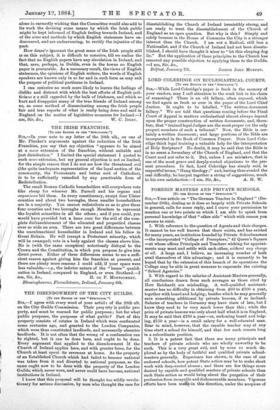LORD COLERIDGE ON ECCLESIASTICAL COURTS. tTo THE EDITOR OP THE
1. SPECTATOR."] Sta,—While Lord Coleridge's paper is fresh in the memory of your readers, may I call attention to the weak link in his chain of reasoning P There is an old fallacy, often exposed, which we find again as fresh as ever in the paper of the Lunt Chief Justice. It ought to be labelled, " The written-document fallacy." We are told that questions coming before the Final Court of Appeal in matters ecclesiastical almost always depend upon the proper construction of written documents, and, there- fore, that " trained legal Judges are the most proper (or the only proper) members of such a tribunal." Now, the Bible is cer- tainly a written document; and large portions of the Bible are incorporated in the Book of Common Prayer. Does Lord Cole- ridge think legal training a valuable help for the interpretation of Holy Scripture P No doubt, it may be said that the Bible is in no sense a formulary of the Church of England, and that the Court need not refer to it. But, unless I am mistaken, that is one of the most grave and deeply-rooted objections to the pre- sent procedure. In fact, Lord Coleridge has simply said, in respectful terms, " Hang theology;" and; having thus evaded the real difficulty, he has put together a string of suggestions, much
to his own satisfaction.—I am, Sir, &c., A. H. W.






































 Previous page
Previous page